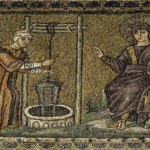We run our website the way we wished the whole internet worked: we provide high quality original content with no ads. We are funded solely by your direct support. Please consider supporting this project.

Was Jesus Fully Human and Fully God?
The New Testament is very clear that Jesus was a full human being. He had to grow in wisdom (Lk 2:52) and learn obedience by going through trials, just like every other human being (Heb. 5:8). He grew hungry and tired, like the rest of us. He experienced the same range of emotions as the rest of us and was tempted in all the ways we are (Heb 4:15). He was, in other words, made like us “in every way” (Heb 2:17). Jesus was a full human being. In fact, all indications are that Jesus still is a full human being, albeit in a resurrected and transformed state.
At the same time, the New Testament also clearly teaches us that Jesus is God. John tells us that, while no one has ever seen God as he is in himself, the Word (Jesus), who is himself God, has made him known (Jn. 1:18). Similarly, in his epistle he refers to the Son of God as “the true God” (I Jn 5:20). Along the same lines, Paul refers to Jesus as “God over all” (Rom. 9:5) and “our great God and Savior” (Titus 2:13) while Thomas calls Jesus “Lord” and “God,” and Jesus commends him for his faith (Jn. 20:28).
The New Testament repeatedly ascribes to Jesus titles and activities that are elsewhere reserved for God alone. For example, the single most common title given to Jesus in the New Testament is “Lord” (kurios) (e.g. Rom 10:9; 1 Cor 1:7). This is the Greek equivalent of Yahweh, the most sacred name for God in the Old Testament. So too, the Bible teaches that God alone is judge and creator, yet Jesus is depicted in these roles in the New Testament (Col 1:16). Similarly, Yahweh alone is said to be “the alpha and the omega” and “the beginning and the end” (Isa. 44:6), yet Jesus says this of himself in the New Testament (Rev. 22:13).
One of the most interesting evidences of Jesus’ divinity occurs when Jesus says to his audience, “Before Abraham was, I am” (Jn. 8:58, emphasis added). The reason Jesus mixes the past and present tense is because by referring to himself as the “I am,” he’s identifying himself with Yahweh who spoke to Moses out of the burning bush saying, “ I am that I am” (Ex. 3:14). His Jewish audience understood exactly what he was claiming for himself, for they immediately picked up stones to stone him for blasphemy.
Finally, and perhaps most impressively, the Bible consistently stresses that humans are to pray to and worship God alone. Whenever humans or even angels find others bowing before them in the Bible, they immediately put a stop to it. Yet we find people – monotheistic Jews no less – worshipping Jesus, and he not only allows it, but encourages it (e.g. Jn 20:28-29). The practice of worshipping and praying to Jesus as Lord is found throughout the New Testament.
The only conclusion we can draw from the New Testament evidence is the one the early church drew at the council of Chalcedon (451 AD); namely, Jesus Christ is fully God and fully human. He’s not (as some teach today) simply a great teacher, an enlightened guru, an inspired prophet or an angel: He’s rather “the Word made flesh” (Jn. 1:14), the very embodiment of God. (The embodiment of God in Christ is known as “the Incarnation”). The Incarnation reveals that God was so in love with humanity, despite our sin and rebellion, that he decided to enter into our sin infested world and become one of us!
Of course, it’s very hard, if not impossible, to understand how a person can be at one and the same time fully God and fully human. But it shouldn’t surprise us that we confront mysteries when trying to comprehend God. After all, we confront paradoxes when studying our own physical world. For example, physicists tell us that light has the property of waves in some circumstances and of particles in other circumstances – yet we have no way of understanding how this is possible. If we confront paradoxes trying to understand the nature of our physical world, it should hardly surprise us if we confront paradoxes trying to understand God!
Image by ecastro via Flickr.
Category: General
Tags: God, Incarnation, Jesus
Related Reading

A Christ-Follower’s Alternative to New Year’s Goals
tomo tang via Compfight Richard Dahlstrom over at Fibonacci Faith offered an alternative to setting New Year’s goals that can steal peace in our lives. What if we committed to attending to all the little revelations God gives us and made space to absorb these God-moments in order to respond well? Let’s all make this…

The Most Beautiful Truth
Jesus was God incarnate. Yet he continually referred to, and prayed to, God the Father as someone who was distinct from himself. He also continually referred to, and claimed to be empowered by, God the Holy Spirit as someone distinct from himself. And yet Jesus, along with all Jews of his time, believed there is…

The Cruciform Center Part 4: How Revelation Reveals a Cruciform God
I’ve been arguing that, while everything Jesus did and taught revealed God, the character of the God he reveals is most perfectly expressed by his loving sacrifice on the cross. Our theology and our reading of Scripture should therefore not merely be “Christocentric”: it should be “crucicentric.” My claim, which I will attempt to demonstrate…

Giant Jesus
Yesterday’s post featured a video of Greg sharing about the role of the church in manifesting God’s character to the world. Here are some follow-up thoughts on that topic. The NT often uses the metaphor of “the body of Christ” to describe the church. When Jesus walked the earth, he did so in an ordinary…

Jesus and the “Favored Nation”
Nationalism lies at the heart of the Old Testament narrative. This concept is intimately wrapped up with the law-oriented covenant God made with the Israelites at Mount Sinai, for at the heart of this covenant is the promise that obedience would bring national security while disobedience would bring national disaster (Deut. 27-28). What we shall…

Jesus: Our Vision of God
At the beginning of his Gospel John taught that “no one has ever seen God, but the one and only Son, who is himself God and is in closest relationship with the Father, has made him known” (Jn 1:18). He is claiming that, outside of Christ, no one has ever truly known God. In the…
